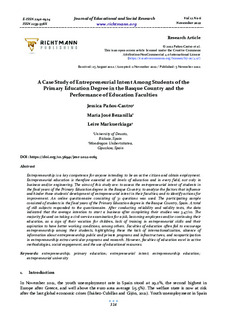Izenburua
A Case Study of Entrepreneurial Intent Among Students of the Primary Education Degree in the Basque Country and the Performance of Education FacultiesEgilea
Argitalpen data
2022Beste erakundeak
Universidad de DeustoBertsioa
Bertsio argitaratuaDokumentu-mota
ArtikuluaArtikuluaHizkuntza
IngelesaEskubideak
© 2022 The AuthorsSarbidea
Sarbide irekiaArgitaratzailearen bertsioa
https://doi.org/10.36941/jesr-2022-0165Non argitaratua
Journal of Educational and Social Research Vol. 12. N. 6. Pp. 314-329Argitaratzailea
RichtmannGako-hitzak
Entrepreneurship
Primary Education
entrepreneurial intent
entrepreneurship education ... [+]
Primary Education
entrepreneurial intent
entrepreneurship education ... [+]
Entrepreneurship
Primary Education
entrepreneurial intent
entrepreneurship education
entrepreneurial university [-]
Primary Education
entrepreneurial intent
entrepreneurship education
entrepreneurial university [-]
Laburpena
Entrepreneurship is a key competence for anyone intending to be an active citizen and obtain employment. Entrepreneurial education is therefore essential at all levels of education and in every field, ... [+]
Entrepreneurship is a key competence for anyone intending to be an active citizen and obtain employment. Entrepreneurial education is therefore essential at all levels of education and in every field, not only in business and/or engineering. The aims of this study are: to assess the entrepreneurial intent of students in the final years of the Primary Education degree in the Basque Country; to analyze the factors that influence and hinder these students’ development of entrepreneurial intent in their faculties; and to identify actions for improvement. An online questionnaire consisting of 31 questions was used. The participating sample consisted of students in the final years of the Primary Education degree in the Basque Country, Spain. A total of 168 subjects responded to the questionnaire. After conducting reliability and validity tests, the data indicated that the average intention to start a business after completing their studies was 3.47/10. The majority focused on taking a civil-service examination for a job, becoming employees and/or continuing their education, as a sign of their vocation for children, lack of training in entrepreneurial skills and their aspiration to have better working conditions, among others. Faculties of education often fail to encourage entrepreneurship among their students, highlighting these the lack of internationalization, absence of information about entrepreneurship public and private programs and infrastructures, and nonparticipation in entrepreneurship extra-curricular programs and research. However, faculties of education excel in active methodologies, social engagement, and the use of educational resources. [-]
Bildumak
Item honek honako baimen-fitxategi hauek dauzka asoziatuta:






















